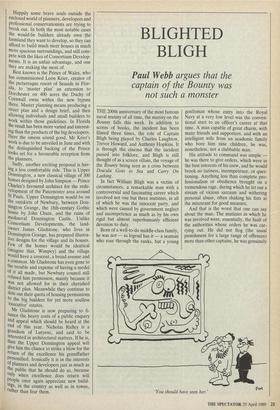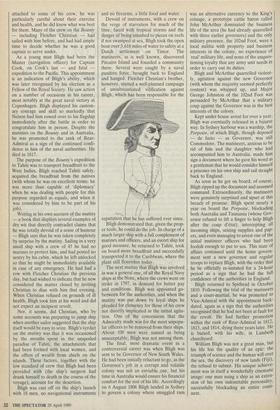BLIGHTED BLIGH
Paul Webb argues that the captain of the Bounty was not such a monster THE 200th anniversary of the most famous naval mutiny of all time, the mutiny on the Bounty falls this week. In addition to scores of books, the incident has been filmed three times, the role of Captain Bligh being played by Charles Laughton, Trevor Howard, and Anthony Hopkins. It is through the cinema that the incident passed into folklore, and Bligh is still thought of as a screen villain, the voyage of the Bounty being seen as a cross between Dracula Goes to Sea and Carry On Lashing.
In fact William Bligh was a victim of circumstances, a remarkable man with a controversial and fascinating career which involved not one but three mutinies, in all of which he was the innocent party, and which were caused by government neglect and incompetence as much as by his own rigid but almost superhumanly efficient devotion to duty.
Born of a well-to-do middle-class family, he was not — as legend has it — a seaman who rose through the ranks, but a young gentleman whose entry into the Royal Navy at a very low level was the conven- tional start to an officer's career at that time. A man capable of great charm, with many friends and supporters, and with an intelligent wife from an academic family who bore him nine children, he was, nonetheless, not a clubbable man.
His attitude to command was simple — he was there to give orders, which were in the best interests of his crew, and he would brook no laziness, incompetence, or ques- tioning. Anything less than complete pro- fessionalism or obedience brought on a tremendous rage, during which he let out a stream of vicious sarcasm and withering personal abuse, often shaking his fists at the miscreant for good measure.
And that is the worst that one can say about the man. The mutinies in which he was involved were, essentially, the fault of the authorities whose orders he was car- rying out. He did not flog (the usual punishment for a large range of offences) more than other captains, he was genuinely 'You should have seen her.' attached to some of his crew, he was particularly careful about their exercise and health, and he did know what was best for them. Many of the crew on the Bounty — including Fletcher Christian — had sailed with him before, and had had ample time to decide whether he was a good captain to serve under.
As a young man Bligh had been the Master (navigation officer) for Captain Cook, on Cook's last — and fatal — expedition to the Pacific. This appointment is an indication of Bligh's ability, which was later recognised by his election as a Fellow of the Royal Society. He saw action on a number of occasions in his career, most notably at the great naval victory at Copenhagen. Bligh displayed his custom- ary courage and skill so markedly that Nelson had him rowed over to his flagship immediately after the battle in order to congratulate him in person. Despite the mutinies on the Bounty and in Australia, he was promoted to the rank of Rear- Admiral as a sign of the continued confi- dence in him of the naval authorities. He died in 1817.
The purpose of the Bounty's expedition to Tahiti was to transport breadfruit to the West Indies. Bligh reached Tahiti safely, acquired the breadfruit from the natives (with whom he was on excellent terms: he was more than capable of 'diplomacy' when he was dealing with people for this purpose regarded as equals, and when it was considered by him to be part of his job).
Writing in his own account of the mutiny — a book that displays several examples of dry wit that directly contradict claims that he was totally devoid of a sense of humour — Bligh says that he was taken completely by surprise by the mutiny. Sailing in a very small ship with a crew of 45 he had no marines to protect him, and had posted no sentry by his cabin, which he left unlocked so that he might be immediately available in case of any emergency. He had had a row with Fletcher Christian the previous day, but had wished to indicate that he now considered the matter closed by inviting Christian to dine with him that evening. When Christian refused on grounds of ill health, Bligh took him at his word and did not expect an incipient revolt.
Nor, it seems, did Christian, who by some accounts was preparing to jump ship when another sailor suggested that the ship itself would be easy to seize. Bligh's verdict on the mutiny was that it was occasioned by the months spent in the unspoiled paradise of Tahiti, the attachments that had been formed with local women, and the offers of wealth from chiefs on the islands. These factors, together with the low standard of crew that Bligh had been provided with (the ship's surgeon had drunk himself to death in the course of the voyage), account for the desertion.
Bligh was cast off on the ship's launch with 18 men, no navigational instruments and no firearms, a little food and water.
Devoid of instruments, with a crew on the verge of starvation for much of the time, faced with tropical storms and the danger of being smashed to pieces on reefs if not swamped at sea, Bligh took the open boat over 3,618 miles of water to safety at a Dutch settlement on Timor. The mutineers, as is well known, discovered Pitcairn Island and founded a community there. Several were caught by a naval punitive force, brought back to England and hanged. Fletcher Christian's brother, however, started a well-planned campaign of unsubstantiated vilification against Bligh, which has been responsible for the reputation that he has suffered ever since.
Bligh demonstrated that, given the prop- er tools, he could do the job. In charge of a much larger ship with a full complement of marines and officers, and an escort ship for good measure, he returned to Tahiti, took on board more breadfruit and successfully transported it to the Caribbean, where the plant still flourishes today.
The next mutiny that Bligh was involved in was a general one, of all the Royal Navy ships at the Nore, where the crews went on strike in 1797, in demand for better pay and conditions. Bligh was appointed go- between for the authorities, and when the mutiny was put down by loyal ships he pleaded for clemency for those of his crew not directly implicated in the initial agita- tion. One of the concessions that the Admiralty made was for the most unpopu- lar officers to be removed from their ships. About 100 men were named as being unacceptable; Bligh was not among them.
The final, most dramatic event in a controversial career was when Bligh was sent to be Governor of New South Wales. He had been initially reluctant to go, as the Governor's job in a corrupt and volatile colony was not an enviable...one, but his time in Australia would ensure his financial comfort for the rest of his life. Accordingly on 6 August 1806 Bligh landed in Sydney to govern a colony where smuggled rum was an alternative currency to the King's coinage, a prototype cattle baron called John McArthur dominated the business life of the area (he had already quarrelled with three earlier governors) and the only military presence, the 102nd Foot, were a local militia with property and business interests in the colony, no experience of 'real' military life, and none of the unques- tioning loyalty that any army unit needs in order to carry out its duties.
Bligh and McArthur quarrelled violent- ly, agitation against the new Governor (with whom the majority seemed perfectly content) was whipped up, and Major George Johnston of the 102nd Foot was persuaded by McArthur that a military coup against the Governor was in the best interests of the colony.
Kept under house arrest for over a year Bligh was eventually released in a bizarre way. In Sydney harbour was a warship, the Porpoise, of which Bligh, though deposed — de facto — as Governor, was still Commodore. The mutineers, anxious to be rid of him and the daughter who had accompanied him to Australia, made him sign a document where he gave his word as a gentleman that he would consider himself a prisoner on his own ship and sail straight back to England.
As soon as he got on board, of course, Bligh ripped up the document and assumed command. Extraordinarily, the mutineers were genuinely surprised and upset at this breach of promise. Bligh spent nearly a year on board the Porpoise, blockading both Australia and Tasmania (whose Gov- ernor refused to lift a finger to help Bligh after the coup d'etat), intercepting all incoming ships, seizing supplies and pap- ers, and even managing to arrest one of the initial mutineer officers who had been foolish enough to put to sea. This state of affairs continued until the home govern- ment sent a new governor and regular troops to replace Bligh, with the order that he be officially re-instated for a 24-hour period as a sign that he had the full confidence of the authorities in England.
Bligh returned to Spithead in October 1810. Following the trial of the mutineers and a court-martial, he was promoted to Vice-Admiral with the appointment back- dated, again as a sign that the authorities recognised that he had not been at fault for the revolt. He had further promotion within the rank of Rear-Admiral in 1812, 1813, and 1814, dying three years later. He is buried, with his wife, in Lambeth churchyard. William Bligh was not a great man, but his life has the quality of an epic: the triumph of science and the human will over the sea, the discovery of new lands (Fiji), the refusal to submit. His unique achieve- ment was in itself a wonderfully cinematic image: one man using a ship as an exten- sion of his own indomitable personality., successfully blockading an entire conti- nent.



















































 Previous page
Previous page